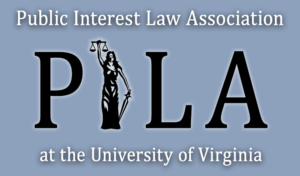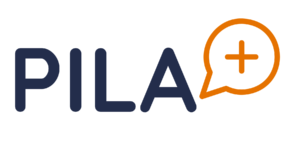PILA+ Information
Introduction
The PILA+ program is designed to help close a gap in our public service funding. This is the pilot year of this program and we look forward to working with the UVA community to make this a reality! The purpose of PILA+ is to provide additional funding for students seeking to do a public interest summer internship who have demonstrable financial need for additional summer funding. It will serve as a supplement to the law school’s pre-existing public service summer funding, including the newly re-named UVA Law Public Service Summer Grants and our in-house fellowships administered through the Public Service Center (PSC). This program will be 100% student-run, fundraised, and administered.
Rationale
The current grants program does not take into account demonstrated student financial need. We believe that it is essential to continue having guaranteed baseline financial support for all students and are grateful for the Law School’s continued support of public service students. While PILA will continue to advocate with the administration on behalf of the public service community to increase resources, we view PILA+ as a necessary supplement to the already existing grants program in order to further endeavor to provide additional support for public service students. We hope that the PILA+ program will provide necessary additional assistance to allow students further financial flexibility to pursue public service internships of their choice.
Of our primary goals, we hope to provide students in more expensive geographic internship locations with additional resources to encourage students to pursue jobs most suited for their career aspirations rather than ones in the lowest cost of living regions. For instance, students can live in the Charlottesville/Albemarle area for two to three months on $4,000 but it is incredibly difficult for even the most frugal students to live in New York City or Washington, DC on that amount of money without relying on additional loans or family support. In addition, many students are forced to take out 12-month leases in Charlottesville and thus end up paying two rents over the summer. We are hopeful that the additional grant will help alleviate some of the financial burden on these students and put money in the hands of students who need it most.
Program Administration
Eligibility: The grants are guaranteed to all eligible students. Students must receive a UVA Law Public Service Summer Grants grant. The Public Service Center will provide PILA with a list of all eligible students for the UVA Law Public Service Summer Grants grant. PILA will then invite those students to apply for the PILA+ grant.
In addition to meeting the eligibility requirements for the UVA Law Public Service Summer Grant, students must verify on their honor that:
- The student will live in a high cost of living area, defined as any area where the average rent is $2,000 or more per month; and
- The student will not be receiving a summer stipend of over $1,000 from their summer employer; and
- The student certifies that they will be paying two separate rents over the summer; and
- The student does not expect to receive more than $2,000 of family support over the summer intended to assist with their cost of living; and
- The student has not received a summer fellowship (in-house or otherwise) for over $2,000.
Students must meet all of the criteria above to be eligible. Students will be on their honor to disclose any changes (i.e. that they have received a fellowship of more than $2,000) after they have received a PILA+ grant to PILA within 72 hours.
High Cost of Living: For the purpose of the PILA+ grant, high cost of living will be defined as an area with an average rent cost for a 1 bedroom apartment in city center of $2,000 or more per month. To determine the cost of living, students must use Numbeo. Numbeo is a crowdsourced platform determining cost of living, consumer pricing etc. It has been used by prominent global organizations including the International Monetary Fund and the World Bank. To determine cost of living, students should look up the city of their internship on Numbeo and see the average cost of a one bedroom apartment in city center. The student should use the physical address of their place of work to determine cost of living. Please see “Appendix A” at the end of this packet for detailed step-by-step instructions.
Stipend: Students may not earn more than $1,000 from their qualifying public service or judicial employer. This amount does not include money earned from jobs other than their public service internship. For instance, a student may make more than $1,000 as a Research Assistant in addition to their qualifying public service or judicial employer. Likewise, a student may earn more than $1,000 working as a babysitter, pet sitter, waiter etc.
Rent: Students must certify that they will be paying two separate rents over the summer in order to do their internship in person (i.e. one in Charlottesville and one in the city where their internship is located). For the purposes of this question, if a student sublets their residence in Charlottesville for the summer, they are not paying two separate rents.
Additionally, if a student lives with a friend or family member during the summer in the city where their internship is located, they must pay rent to qualify. Their host can offer them below-market rent but the host must charge more than a nominal fee. For the purposes of this question, the host cannot provide rent in return for services. For instance, if a student lives with a member of their family in return for helping out with the chores, baby or pet sitting etc., this does not count.
Family Support: Family support includes all money going towards student cost of living for the summer. When determining your level of family support, please think broadly. Many things count as family support including: rent support, phone plans, money for groceries, car insurance, car payments etc. For the purposes of this question, we do not consider health insurance or support for medical costs as family support. Family support can come from any member of your family (significant other, parents, god-parents, grandparents, aunts/uncles etc.).
For the purpose of this question, only family support designed to help cover cost of living expenses during the summer counts. This does not include family support during the semester, tuition support, or money for weddings or other family events.
When determining family support, we ask students to keep in mind the spirit behind the question and the grants program.
Summer Fellowship: Students may not receive more than $2,000 in combined gross summer fellowship funding other than the UVA Law Public Service Summer Grant and the PILA+ grant. This includes in-house fellowships from UVA (e.g. deWilde, John Paul Stevens, etc.) and outside fellowships for the students’ summer cost living. This does not include fellowships or scholarships designed to cover student tuition or living expenses during the academic year. This does not include awards or other honors.
Fundraising: PILA will continue to hold our traditional fundraising activities including our silent and live auctions, book sales, restaurant percentage nights etc. In the past, PILA had a fundraising obligation to the Law School in order to support guaranteed grants to all students. The Law School has graciously agreed to lift this obligation. Now, all money that PILA raises will go towards the PILA+ grants program.
Grant Disbursement Process: In March of every year, PILA will access its fundraising amount to-date. PILA will then divide the money into three parts:
Part 1: At the PILA Board’s discretion, PILA will put aside an amount of money each year in reserve. This money will be used to cover taxes related to the grants and other necessary purposes.
Part 2: Grant money.
PILA will then equally divide the funds in Part 2 among all eligible students.
The money will be disbursed to students by the Law School Foundation.
Important Dates
February 11, 2022: Public Service Summer Grant applications due by 5 pm EST*
March 18, 2022: PILA+ applications due by 5 pm EST*
April 15, 2022: Public Service Summer Grant disbursement
April 22, 2022: PILA+ grant disbursement
*Absolutely no late applications will be accepted.
Conclusion
PILA remains deeply committed to the public service community and to encouraging public service work at UVA law. As the baseline public service summer grants have evolved throughout the years to better serve UVA law students, we feel as an organization we should as well. With the continuing support of the administration, faculty, and students, we are very excited to have the chance to fundraise in the ways we have done in the past and to the same extent, for this program and to put money directly in the hands of public service students. As always, we appreciate and value your ongoing support, especially during our pilot year. For any questions or concerns, please feel free to reach out to the PILA Grants Director (Morgan Maloney at mvm7rw@virginia.edu) or PILA President (Elizabeth Harris at ebh6pz@virginia.edu).

